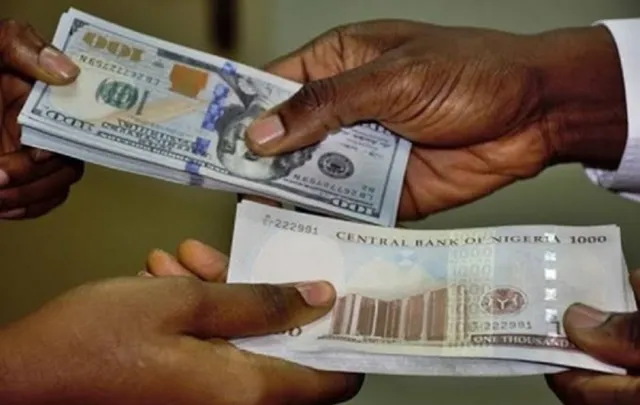Commercial banks and Bureaux De Change (BDCs) are in talks on strategic steps to boost dollar liquidity and save sliding naira, The Nation investigations have shown.
The alliance, being understudied by the Central Bank of Nigeria (CBN), will require the banks to sell proceeds of international money transfers to BDCs at the Investors and Exporters (I&E) window rate.
The DBC operators will in turn sell the foreign currencies to retail end-users.
A source said the BDC operators have been advising the CBN to revisit its 2016 model, which permitted the banks to sell dollars to BDCs. The, source, a BDC operator, spoke on condition of anonymity.
Ahead of possible implementation of the plan, the CBN last weekend, issued a circular to BDCs. The circular signed by CBN Director, Trade and Exchange Department, O.S Nnaji, titled: “Operational Mechanism for Bureau De Change Operations in Nigeria”, said the guidelines were to improve the efficiency of the forex market.
The apex bank pegged the spread on buying and selling by BDC operators within an allowable limit of -2.5 per cent to +2.5 per cent of the forex market window weighted average rate of the previous day.
“the mandatory rendition by BDC operators of the statutory periodic reports (daily, weekly, monthly, quarterly and yearly) on the Financial Institution Forex Rendition System (FIFX) which has been upgraded to meet individual operator’s requirements.”
The CBN stopped dollar sales to BDCs in July 2021, accusing the operators of carrying out illicit transactions. The apex bank also stopped issuing new licenses for BDCs and directed weekly dollar sales to commercial banks.
But, the banks failed to deliver on the responsibilities given to them, as many of the lenders were not selling dollar allocations to customers in need of forex.
The source claimed said that the adoption of the policy in 2016, was magical as the naira firmed up against the dollar and other global currencies.
A July 22, 2016 circular, signed by former CBN Director, Trade & Exchange Department, W.O. Gotring, titled: Sales of Foreign Currency Proceeds of International Money Transfers to Bureau De Change operators, said the move was in the continued effort to ensure the stability of the exchange rate and to encourage participation of all critical stakeholders in the foreign exchange market.
It directed authorised dealers who are agents to approved International Money Transfers Operators IMTOs) to sell foreign currency accruing from inward money remittances to licensed BDCs.
The directive states,
“It should be noted that all IMTOs are required to remit foreign currency to the agent tanks for disbursement in Naira to the beneficiaries while the foreign currency proceeds shall be sold to the BDCS”.
“The foreign currency proceeds of International Money Transfer sold to BDC Operators shall be retailed to end users in compliance with the provisions of Anti-Money Laundering Laws and observance of appropriate Know Your Customer (KYC) principles, including the use of Bank Verification Numbers (BVNs).
“Furthermore, authorised dealers and BDC operators are required to render returns on their operations daily and monthly to the Director, Trade & Exchange, the CBN via e-FASS application in accordance with extant regulation.
“For the avoidance of doubt, failure by any authorised dealer and/or BDCs operator to render returns as and when due shall attract appropriate sanction, including withdrawal of dealership license. Please ensure strict compliance,” the apex bank stated.
In an August 9, 2016 follow-up circular, the regulator pegged weekly dollar sales to each BDC by authorised dealers at $30,000.00.
It also allowed a BDC to nominate its preferred authorised dealer, Deposit Money Bank (DMB) and can only procure the said amount from only that bank of its choice in a week.
Funds purchased by BDCs were disbursed for Business Travel Allowance/ Personal Travel Allowance (BTA/PTA), overseas school fees and overseas medical fees, which must not exceed $5,000 per transaction.
Reacting to the development, President, Association of Bureaux De Change Operators of Nigeria (ABCON), Dr. Aminu Gwadabe, said the CBN’s circular on operational mechanism have ushered in sanity and confidence in the market. He said the naira has made massive gain at both the official and parallel markets following last weekend’s directive by the apex bank on BDCs’ operations.
He said,
“It is also welcoming as the CBN’s circular have set the pace for the integration of the BDCs in the harmonized I&E window through the use of the weighted average closing rate for BDCs trading and return rendition obligations.
“It has also sent messages for the erring operators that may risk loosing their operational licenses for failing to meet up with the circular.
“It further explained that operators that are in business can send transactions returns while those operators that are not in trading which form the major component of operators can send a ‘Nil return’ as specified in the circular.”
To sustained the tempo achieved in naira appreciation,
“First I will advise members to adhere to the new requirements as ABCON shares their concerns of non- trading activities and assured them of our continuous efforts to bring them back to business.
“We also seek for the reinstatement of July 2016 circular which authorised banks to engage with BDCs on diaspora remittances and autonomous window to enhance liquidity in the critical retail end of the market an act as effective tool of CBN’s transmission mechanisms for exchange rate stability in the market.”
“We want to assure the apex bank of our commitments for our members obligations to AML/CFT procedures. We believed in the spirit of corporate governance, record keeping, rendition of returns and KYC screening solutions.”
The weekend, the naira, closed at N739.52/$ at the I&E window, appreciated to N810/$ in the parallel market.
The local currency has lost over 30 per cent of its value in the last one year.


